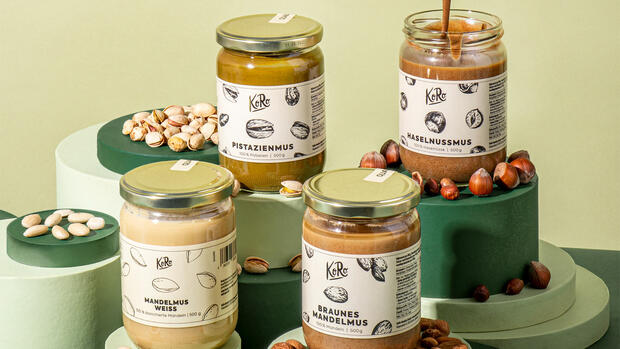The company specializes in large packs of healthy food.
Berlin In the middle of the currently very difficult financing environment for start-ups, the Berlin food company Koro has collected fresh money from investors. Koro now has a further 20 million euros at its disposal to accelerate growth. “We are also building up a buffer so that we are less dependent on the market situation,” says Koro Managing Director Florian Schwenkert of the Handelsblatt. The start-up is best known for its various nut creams, dried fruit in bulk packs and various snacks – including many vegan variants – which are sold on its own platform, in many online shops and around 9000 retail stores in 17 markets.
Unlike many other start-ups, Koro is currently profitable and growing significantly. In 2019, five million euros were generated, says Schwenkert. In the corona crisis, Koro had a boom. In 2020, the company turned over 60 million euros, last year 90 million euros. That was below the original expectations. Because Koro has also felt that many consumers pay more attention to the costs when shopping for groceries in view of the high inflation.
>> Read about this: Survey: Only 40 percent of Germans can save
“Many have to save and no longer buy organic products,” says Schwenkert. Koro now benefits from the fact that it can offer “fair prices” thanks to large packaging, many of its own products and direct relationships with manufacturers. In the meantime, products from the Berliners also have a permanent place with Deutsche Bahn and the drugstore chain dm.
TV advertising thanks to Pro Sieben Sat 1
With the fresh injection of capital, new financiers such as the investment arm SevenVentures from Pro Sieben Sat 1, the British food group Associated British Foods and Haub Legacy Ventures are coming on board. SevenVentures brings Koro advertising time on all channels of the media company. That will increase brand awareness, says SevenVentures boss Florian Hirschberger.
All of the existing institutional investors, such as HV Capital and Partech, participated in last year’s Series B increase of EUR 50 million. The company has now taken in a total of 75 million euros. Despite the more difficult overall situation, the rating was significantly higher than a year ago, says Piran Asci, who joined Koro in 2016 as a co-founder. At that time, he participated, using all the money he received from the sale of his Yu-Gi-Oh trading cards.
>> Also read: European investors could raise less money than they have since 2015
Due to the ongoing economic weakness and interest rate turnaround, many lenders are currently holding back. According to the data provider Pitchbook, investments in European start-ups fell by 32 percent from January to March.
Florian Schwenkert, Piran Asci and Constatinos Calios want to keep growing with Koro.
(Photo: PR)
Koro was able to score points in the financing talks because, unlike many other start-ups, it is no longer making losses and is still growing. “In these times, Koro has managed to manage the rather difficult balancing act between strong growth and profitability,” HV Capital partner Alexander Joël-Carbonell explains his renewed investment. Koro is perceived as a sustainable but also affordable brand.
In the long term, Koro is aiming for a larger round of financing. This is planned, says Schwenkert.
Founded in 2014, the start-up can look back on eventful times: Georg Kofler’s Social Chain AG was one of the investors – and was even the majority shareholder at one point. In 2022, Social Chain AG left after a dispute with the management. The range has also changed. At the very beginning, Koro sold drugstore items and, in the meantime, also wooden toys.
More: Which consumer stocks offer price potential
